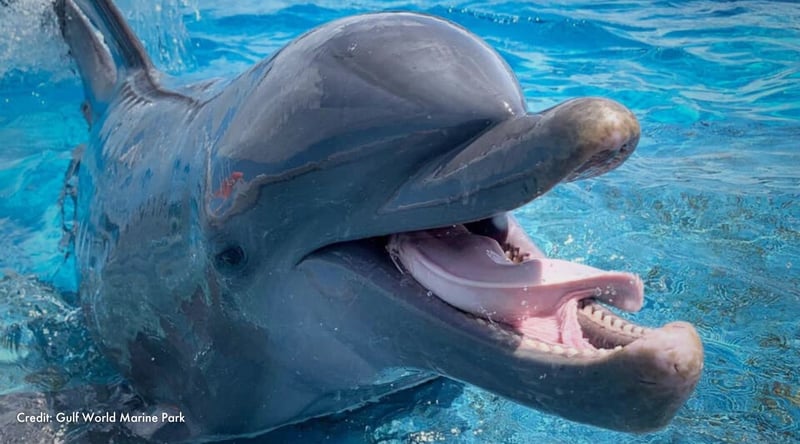
Another dolphin has died at Gulf World Marine Park, and the industry’s pattern of neglect continues.
Jett, a 14-year-old bottlenose dolphin, suffered a tragic and entirely preventable death at Gulf World Marine Park in Panama City, Florida. According to reports, Jett sustained acute head trauma after colliding with the side of his tank during a performance. The National Oceanic and Atmospheric Association confirmed the manner of death in an email.
According to eyewitnesses, Jett was performing a trick where he jumped out of the air, landing head-first into the shallow pool.
The audience was quickly ushered out, and soon after, trainers were seen in tears—an all-too-familiar scene at marine parks where wild animals are forced into unnatural behaviors for entertainment.
Jett is the fourth dolphin to die at Gulf World in less than a year. In October 2024, three dolphins—Gus, Turk, and Nate—died within days of each other. The facility has yet to provide full transparency about these deaths, but the pattern is clear: dolphins are dying at an alarming rate, and the conditions they are subjected to are unacceptable.
Liz Cabrera Holtz, Senior Campaigns Manager at World Animal Protection US, condemned the incident, stating,
“The death of Jett, a bottlenose dolphin, marks the FOURTH death of dolphins in under a year at Gulf World Marine Park. This venue and the rest of the captive dolphin industry need to stop breeding dolphins for profit, otherwise these deaths will continue. Dolphins are charismatic and social beings who deserve more than a lifetime in unnatural and cruel conditions. Entertaining tourists is not a justification for their suffering.”
Dolphins are highly intelligent, social beings who thrive in the vast, complex environments of the ocean. In the wild, they form intricate relationships, swim up to 60 miles a day, and engage in natural hunting behaviors. In captivity, they are confined to tiny tanks, deprived of the space and stimulation they need, and forced to perform for the entertainment of tourists. The stress of confinement often leads to abnormal behaviors, illness, and even premature death—Jett’s tragic fate is just another example of this.
Gulf World has already been under scrutiny for inadequate conditions, including poor water quality, algae overgrowth, and a lack of proper shade for the animals, and these conditions may have played a role in Jett’s fatal miscalculation. This is not unlike another venue owned by The Dolphin Company: Miami Seaquarium.
Currently in court battles with Miami-Dade County over a lease termination, Miami Seaquarium also has severely inadequate conditions for the animals it holds. In April 2024, World Animal Protection US obtained drone footage over the venue, showing dolphins, rays, and sharks swimming in barren, filthy concrete pools. Miami Seaquarium had been cited multiple times by the United States Department of Agriculture (USDA) for poor water quality, dilapidated enclosures, crumbling tanks, and lack of veterinary support.
It’s clear that The Dolphin Company doesn’t care about the animals in their venues—they only care about profiting off of them. If you love dolphins and other marine animals, the best thing you can do for them is to never visit a marine park that keeps them captive and forces them to perform.
For more updates on how you can help animals suffering at marine parks, sign up for our email list.